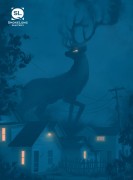As a celebrated short story writer with four (hello!) award-winning collections, you’re the perfect person to answer this question: How does your experience of writing flash differ from your experience of writing a short story?
It takes longer.
The image of the mother’s skull is grotesque and unforgettable and brilliant—the kind of image that sets a writer on her path. And so I’m curious to know if it’s the original impetus behind “It’s Over.” If not, can you share how you came to write your story?
The idea of the story came from—was stolen from—another writer whose pious but at the same time lip-smacking memoir about watching her mother’s cremation frankly upset me. The daughter didn’t seem to know how much she wanted her mother dead or how badly she needed to make damn sure she was. She appeared to be grieving but when she saw her mother’s hair flare up in the retort, for instance, she shouted, You look beautiful, Mom, and snickered. I was fascinated by the passive-aggression in her account—and repelled. I couldn’t begin to access its peculiar rich dark power; I failed, and I ended up, I think, watering my own fictional version down. I did add the image of the skull myself—that was fun to do—but the real story belongs to the first writer, and she hasn’t written it yet. Maybe someone reading this can.
The dynamic between sister and brother is finely rendered, yet form dictates that the reader has to infer much about the history they share with their mother. As you worked, how much of this history—if any—was fully formed in your mind?
In my mind, the mother damaged the brother more than the sister. I think the sister escaped. The mother perhaps kept the brother home too long, depended on him too heavily both for physical and emotional support, belittled him, spoiled him, and soured his sexual life with her jealousy and need for control. He was the hurt child to me.
Many of us in the U.S. grow up being told to share! Share! SHARE! our feelings, but now I’m wondering about the wisdom of that advice. This brother and sister, after all, connect profoundly in their agreed-upon silence. Do we talk too much? What role can/should silence play in our relationships?
I love Samuel Beckett, his pauses and ellipses, so perhaps I try to emulate him too much in my writing. In my life, I am a chatterbox, and if I had been the sister I would have been rattling away in the crematorium like a magpie. Most people who know me have the sense not to listen.
And finally, you taught fiction writing at various universities for many years. Can you drop into teacher mode for a moment and share some advice on character development in general or, if you like, within the confines of flash?
Oh gosh—character development within the confines of flash … that’s a hard one. Does this line from Mark Twain help? “She was not quite what you would call refined. She was not quite what you would call unrefined. She was the kind of person that keeps a parrot.” Maybe that’s a thumbnail sketch rather than an actual story, but it tells me so much. I have also long loved Richard Brautigan’s “A fifty-three-year-old cat burglar from Santa Monica.” And I once tried to define an entire Southern city with a story titled “Honk If You Love Jesus.” The story consisted of a single word, endlessly repeated down the page: “HonkHonkHonkHonk” etc.



 The SmokeLong Grand Micro Contest (The Mikey) is now an annual competition celebrating and compensating the best micro fiction and nonfiction online.
The SmokeLong Grand Micro Contest (The Mikey) is now an annual competition celebrating and compensating the best micro fiction and nonfiction online.